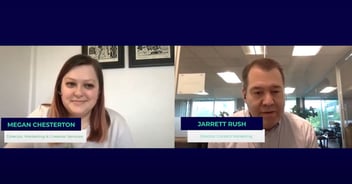You’ve known the benefits of learning management systems for years. You’ve been touting ease of use. You’ve been highlighting how it can help businesses scale their employee training programs. It’s too bad that it took something like a global pandemic to get people to listen.
But now they are listening. They are initiating conversation. The ball you’ve been trying to get rolling finally is. And without any real timetables for when schools will return from this COVID-19 pandemic, there are organizations needing solutions like yours now. It’s time to turn on the marketing machine that you’ve been building for so long. Before you do that, though, take one more look. Ask yourself if you’ve done all you can to make this LMS marketing plan as effective as it can be? Because we’d argue that maybe you haven’t.
The Problem with Your LMS Marketing Plan
As a seasoned marketing veteran, your marketing plan has all the elements the textbooks say you need—buyer personas, messaging, buyer’s journeys, etc. But we’d argue there’s still a problem, and it’s this: Your LMS marketing plan is built off assumptions and not evidence.
You assume you know your buyer.
Granted, you do know some things about your buyer. You know where your buyer sits inside of their organization. You know broadly what their daily challenges are. It’s enough to build a nice vague profile. But to a vague profile is only going to get you so far. What you need are specifics. The kind of specifics that you only get from conversations with your actual buyers.
When you build your buyer personas off of conversations, you move away from the assumptions you have about your buyer and start dealing with facts. You can learn specifics about what prompts them to look for a solution like yours. You learn specifics around the barriers you might need to overcome to win their business. You learn specifics about where they go to find information and what they look for in a partner. And when you know those specifics you can build an LMS marketing plan that’s highly targeted and highly effective.
You assume your message will resonate.
Buyer personas should be the foundation of any marketing program. Everything builds from there. That includes messaging. So, if you’re building your brand messaging based off of what you assume about your buyer then the best you can do is hope your messaging resonates.
Now, it is possible with buyer personas based on assumptions to build messaging that’s relevant to your buyers, but relevant messaging only gets you so far. You need messaging that resonates.
Relevant content is broad. It has wide appeal. For example, food content is relevant to all of us because we are humans. We need food to live. If that content is about specific types of food, specific ingredients, and specific diets then it will resonate with those who identify as foodies.
When you know who your buyer is—really know, not just assume—you can build messaging that fills gaps in the market, messaging that helps you stand out, messaging that highlights what your buyers are looking for and speaks directly to them.
You assume that lead will work its way to a close.
Inbound marketing is one of those things that’s easy to understand conceptually.
Write a blog > connect it to a downloadable asset > collect an email > win a new customer.
The reality is, it’s much more difficult in practice. There are a lot more steps inside of all those steps. It almost always takes multiple touches before someone downloads and asset. And once they do you have to carefully nurture them before you can pass them off to the sales team.
But you’ve made the investment in marketing automation tools a few years ago (We prefer HubSpot. Feel free to ask us why.) and spent some time setting up nurture paths, so everything’s in good shape.
Again, that’s what you assume. The evidence probably says something different. Inbound marketing is often sold as a set-it-and-forget-it proposition, but it’s anything but. For inbound marketing to be effective you need to constantly be monitoring and modifying those nurture paths. You need to be tweaking your lead scoring. Your buyers’ preferences a few years ago aren’t your buyers’ preferences now. Your inbound marketing program needs to reflect that.
This is a time of opportunity. The market has never been more primed for eLearning software solutions. Moving quickly is important, but if your LMS marketing plan is based on assumptions, you could be moving quickly in the wrong direction.
eBook: How eLearning Providers Can Use PR and Marketing to Build Trust with School Districts and Businesses
The time is now for the eLearning market. But how do you sell this software to the organizations that need it?
We love helping mid-market B2B tech companies like yours grow with purpose. If you are wanting to turn this moment into momentum, let us tell you how we can help.

 4 min read
4 min read






 1 min read
1 min read

